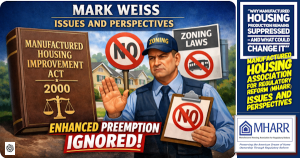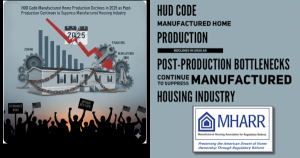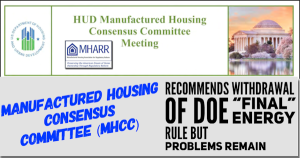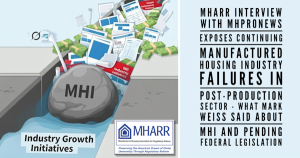The Manufactured Housing Association for Regulatory Reform (MHARR) press release that follows as well as monthly manufactured housing production data are available for re-publication in full (i.e., without alteration or substantive modification) and without further permission given proper attribution and/or link back to MHARR. Republication of the Freedom of Information Act (FOIA) request to HUD regarding Teresa Payne is included as part of this MHARR news item.
FOR IMMEDIATE RELEASE Contact: MHARR
(202) 783-4087
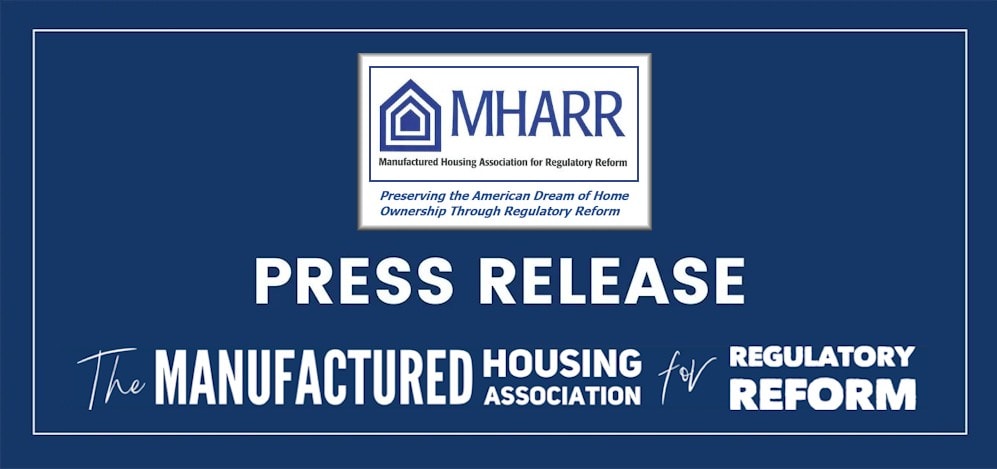
MHARR ADDRESSES GROWING CONCERNS
REGARDING PENDING LEGISLATION
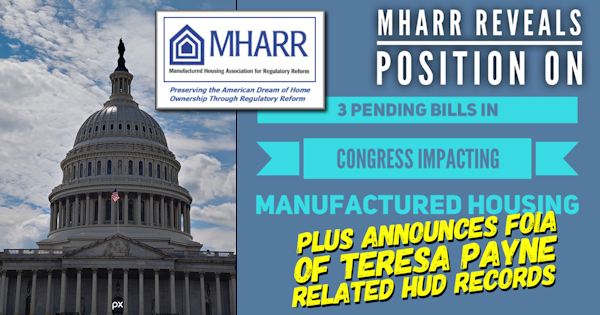
Washington, D.C., May 19, 2025 – The Manufactured Housing Association for Regulatory Reform (MHARR) has undertaken intensive activity in Congress to protect the rights and interests of smaller HUD Code industry businesses and particularly independent HUD Code manufacturers. Such activity relates to and is a consequence of efforts by the industry’s largest corporate conglomerates, and their representatives, to enact changes to key elements of the federal regulatory law governing manufactured housing and to implement new laws that could have serious impacts on the manufactured housing market unless corrected as to certain deficiencies and improved.
Currently, three bills with implications for federally-regulated manufactured housing are being considered in Congress. One draft bill, entitled the “Expansion of Attainable Homeownership through Manufactured Housing Act,” would, among other things, strike the current requirement in federal law (in the statutory definition of “manufactured home”) that manufactured homes be “built on a permanent chassis” and instead allow HUD Code homes to built “with or without a permanent chassis.” While MHARR, from the time of its establishment, has supported the removal of the above-quoted five word permanent chassis requirement and its replacement with optional “with or without a permanent chassis” language – and still does support such an modification, MHARR has also made it clear that it has significant concerns with a legislative process that could lead to other possible proposed amendments to the industry’s touchstone federal law that could potentially be negative and/or damaging.
In addition, there is no basis for any law pertaining to HUD Code manufactured housing to be entitled – or otherwise use the term – “attainable” housing. The relevant language used in current manufactured housing law, and which MHARR successfully fought to include specifically in the Manufactured Housing Improvement Act of 2000 (2000 Reform Law), is “affordable” homeownership – a term with an established and specific meaning (for example, being defined as housing costs of “no more than 30 percent of gross income” as set forth in section 3(1) of the bi-partisan Housing Supply Frameworks Act addressed below), rather than an arbitrary and inherently meaningless term such as “attainable.”
The term “attainable,” moreover, if included in subsequent legislation could be used to undermine or put a gloss on the meaning of “affordable” or “affordability” and would be inconsistent with other federal housing legislation based on the term and concept of “affordable” housing. Rather, it appears that the term “attainable,” which has been used for public relations purposes in recent years by the industry’s largest corporate conglomerates, is instead being promoted in the interests of those conglomerates.
The second draft bill affecting manufactured housing would ostensibly require any federal agency seeking to establish a “federal manufactured home construction and safety standard” (including “energy efficiency” standards) to first obtain the approval of the Secretary of HUD. While MHARR, again, supports the intent and objective of this draft bill, it does not believe that the language used is appropriate or sufficient – for multiple reasons – to accomplish its alleged and stated objectives. MHARR, accordingly, has already made it clear that the language of the draft bill should be carefully reviewed and adjusted to make it as effective and “watertight” as possible to prevent draconian energy efficiency or energy conservation standards from being imposed on manufactured housing in the future. Such legislation, at this time, would be consistent with MHARR’s “energy standards” strategy as set out in detail in August 2022 – to first slow the DOE May 31, 2022 standards through litigation and then seek legislative reform after the end of the Biden Administration.
The third bill that MHARR has also begun addressing is the Housing Supply Frameworks Act (HSFA), which has been introduced in both houses of Congress and was addressed by MHARR in greater detail in an April 22, 2025 News Release entitled “Bi-Partisan Bill Seeks Zoning Reform – Could Augment Enhanced Federal Preemption.” While that bill, as MHARR noted, is generally positive from a HUD Code manufactured housing industry perspective, it contains, among other things, language and scope deficiencies in relation to HUD code homes that will need to be addressed and corrected during the legislative process.
For example, in a key provision calling for “the reduction of obstacles to a range of housing types at all levels of affordability,” it conflates “manufactured” housing with “modular housing.” If not corrected, this will lead to chaos and confusion, as manufactured homes are regulated under federal law, pursuant to federal standards, federally-based enforcement and federal preemption (the three pillars that make manufactured housing the most affordable of all factory-built homes), while “modular” homes are regulated by states and/or localities under state or local building codes. At the same time, the manufactured housing elements would be likely to fall into the same trap as other federal programs, where provisions referring to HUD Code housing and designed to benefit HUD Code residents and consumers seemingly never reach the ground to deliver actual benefits, (see, MHARR’s July 2022 White Paper, “The Exploitation of Federal Housing Finance and Mortgage Funding Assistance Programs and Potential Solutions”), meaning that it is most likely that zoning benefits for manufactured housing, even with this new bi-partisan bill (HSFA) would never materialize. Other similar deficiencies in HSFA must similarly be corrected, if it is to have any beneficial impact at all and, just as importantly, avoid negative impacts.
As always, MHARR will carefully monitor all of these bills and will take any and all actions needed to protect the rights and interests of smaller industry businesses and the lower and moderate American homebuyers who rely on manufactured housing, while simultaneously working to ensure that full and fair competition within the industry is protected.
In addition to the aforesaid legislative activities, MHARR has also taken action in relation to the recent announcement that former HUD program administrator Teresa Payne has been hired as Vice President of “policy” by the Manufactured Housing Institute (MHI).
Specifically, MHARR has filed a Freedom of Information Act (FOIA) request with HUD (see, copy attached) seeking documents related to Ms. Payne’s departure from HUD and any external contacts that she might have had regarding her departure and new role. In addition, the request seeks any documents regarding the ethical aspects of the post-federal employment of a policy-level regulator. MHARR’s concern is and continues to be to ensure that inside knowledge of enforcement or other regulatory and regulatory-related matters is not used to benefit certain regulated parties while disadvantaging others.
MHARR is also reviewing other possible steps pertaining to these concerns.
The Manufactured Housing Association for Regulatory Reform is a Washington, D.C.- based national trade association representing the views and interests of independent producers of federally-regulated manufactured housing.
— 30 —
Manufactured Housing Association for Regulatory Reform (MHARR)
1331 Pennsylvania Ave N.W., Suite 512
Washington D.C. 20004
Phone: 202/783-4087
Fax: 202/783-4075
Email: MHARRDG@AOL.COM
Website: www.manufacturedhousingassociation.org

